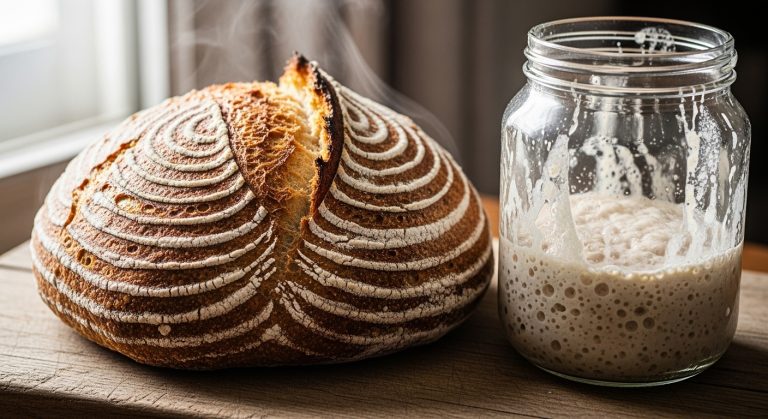Is Store Bought Sourdough Bread Healthy: Know the Facts
Store-bought sourdough bread can be healthier than white bread thanks to its lower glycemic index and beneficial nutrients like calcium and magnesium. However, many commercial varieties may contain additives and preservatives, diminishing their health benefits.
Fermentation is often shortened, reducing nutrient absorption and potentially increasing sugar levels. Look for authentic sourdough with flour, water, and salt to maximize health benefits.
Understanding how to identify genuine options is worth it so you can enjoy the full benefits of this unique bread. Exploring your choices can lead to better eating habits.
Key Takeaways
- Many store-bought sourdough breads contain additives and preservatives, compromising their nutritional value compared to authentic sourdough.
- Shortened fermentation processes in commercial sourdough reduce health benefits, leading to higher glycemic index levels.
- Authentic sourdough should consist only of flour, water, and salt; many store brands fail to meet this standard.
- Store-bought options may not provide the same prebiotic benefits and nutrient absorption advantages found in naturally fermented sourdough.
- Gluten sensitivity risks may increase with store-bought sourdough that includes added yeast and preservatives.
Nutrition Overview of Sourdough Bread
When it comes to nutrition, sourdough bread offers a blend of beneficial components that can support your health. An average slice contains about 185 calories, providing essential nutrients like calcium, potassium, magnesium, folate, and niacin.
The fermentation process enhances nutrient absorption and improves digestibility, which can be particularly helpful for those with gluten intolerance or digestive issues. Additionally, sourdough bread typically has a lower glycemic index compared to white bread, helping to stabilize blood sugar levels—an advantage for individuals managing diabetes.
This is largely due to the presence of prebiotics that nourish gut bacteria, which further support digestive health.
However, keep in mind that not all store-bought sourdough retains these benefits, as many varieties lack the authentic fermentation process and beneficial bacteria found in true sourdough, potentially diminishing their nutritional value.
Health Benefits of Sourdough
Harnessing the power of fermentation, sourdough bread offers a range of health benefits that can positively impact your well-being.
With a lower glycemic index of 54 compared to conventional bread, sourdough helps stabilize blood sugar levels, making it a smart choice for diabetics and pre-diabetics.
The fermentation process deactivates phytic acid, increasing nutrient absorption by up to 70%, enhancing overall health.
Additionally, sourdough acts as a prebiotic, supporting beneficial gut bacteria, contributing considerably to digestive health.
The fiber content in sourdough bread further promotes a healthy gut microbiome, potentially alleviating gastrointestinal symptoms.
Risks of Store-Bought Sourdough
When considering store-bought sourdough, you should be aware of ingredient transparency issues and the potential for misleading labels.
Many breads may lack the nutritional value you expect due to additives and a shortened fermentation process, which can reduce health benefits.
Additionally, some varieties might be unsafe if you’re sensitive to gluten, even if they’re marketed as sourdough.
Ingredient Transparency Issues
Maneuvering the shelves of your local grocery store can be challenging, especially when it comes to choosing authentic sourdough bread. Ingredient transparency is often lacking, leaving you at risk of purchasing bread that’s packed with preservatives and commercial yeast instead of the real thing. To help you navigate this, consider these points:
| Factor | Store-Bought Sourdough | Authentic Sourdough |
|---|---|---|
| Ingredients | Often includes preservatives and sweeteners | Made from flour, water, and salt only |
| Fermentation | Minimal, using commercial yeast | Natural fermentation process |
| Shelf Life | Extended due to additives | Shorter, without preservatives |
Keep an eye out for these signs to verify you’re maximizing the health benefits of your sourdough bread. Always scrutinize labels and ask questions about production methods.
Nutritional Value Concerns
While you might think you’re making a healthy choice by picking up store-bought sourdough, many varieties can fall short nutritionally. Often, these breads contain added preservatives and artificial ingredients, compromising their overall nutritional value.
Additionally, the fermentation process is typically shorter, which means you miss out on health benefits like improved digestibility and nutrient absorption, as well as the delightful flavor that comes from a proper sourdough fermentation process the benefits of fermentation.
Furthermore, some loaves may misleadingly label themselves as “sourdough” without the necessary fermentation, which offers minimal advantages. The high carbohydrate content can be problematic for those on low-carb diets, risking excessive calorie intake.
Gluten Content and Sensitivity
Store-bought sourdough can pose specific risks for individuals concerned about gluten content and sensitivity. Unlike traditional sourdough, which uses a natural starter and undergoes lengthy fermentation, many commercial options contain added yeast, resulting in higher gluten content.
Enhancing sourness through longer fermentation times is one of the benefits of authentic sourdough, as it can lead to the breakdown of gluten. While authentic sourdough fermentation can reduce gluten levels, store-bought versions often lack the necessary time for significant breakdown, making them unsuitable for those with celiac disease.
Additionally, some breads labeled as “sourdough” may not meet the criteria for true sourdough bread, misleading consumers about their gluten content. For gluten-sensitive individuals, the risk of symptoms increases with store-bought sourdough due to lower fermentation times and potential preservatives, diminishing any potential benefits associated with long-fermented sourdough.
Understanding True Sourdough
When you’re considering sourdough, it’s crucial to recognize that true sourdough consists of just three ingredients: flour, water, and salt.
This simplicity allows the natural fermentation process to enhance its nutritional benefits, making it a healthier choice than many commercial options.
The fermentation process not only aids in digestibility but also increases nutrient availability, which can be beneficial for blood sugar regulation, particularly for individuals managing diabetes.
Understanding the authentic ingredients and fermentation process can help you appreciate the unique flavor and health advantages of real sourdough, including the potential for smaller blood sugar spikes.
Authentic Ingredients Matter
Authentic sourdough bread relies on a simple yet powerful trio of ingredients: flour, water, and salt. This true sourdough harnesses a sourdough starter that utilizes wild yeasts and bacteria, enhancing both flavor and digestibility.
In contrast, many store-bought breads contain commercial yeast, additives, or preservatives, compromising their authenticity and negating potential health benefits. When you check the ingredients list, look for those three essential components.
Authentic sourdough undergoes a lengthy fermentation process of 8 to 12 hours, breaking down gluten and improving nutrient absorption, which can greatly enhance dietary choices and support various bodily functions improving nutrient absorption.
Many grocery options skimp on fermentation time and starter, resulting in diminished flavor and nutrition. To maximize health benefits, always choose bread made with genuine, minimal ingredients.
Fermentation Process Explained
The fermentation process is the heart of true sourdough, transforming simple ingredients into a flavorful and nutritious loaf. It involves wild yeast and lactic acid bacteria from a starter, which work together to pre-digest gluten, enhancing the bread’s digestibility.
This slow fermentation can take several hours to days, resulting in a tangy flavor and unique texture. Lactic acid bacteria play an essential role by increasing nutrient bioavailability, breaking down phytic acid, and improving mineral absorption.
Additionally, authentic sourdough typically has a lower glycemic index compared to standard bread, making it a better choice for stabilizing blood sugar levels.
Look for visual indicators like a rustic crust and uneven crumb structure, all signs of a true fermentation process.
Nutritional Benefits Highlighted
Understanding the nutritional benefits of true sourdough bread can greatly impact your dietary choices. By choosing true sourdough, you’re opting for a bread that offers several health advantages:
- Enhanced Nutrient Absorption: Wild yeasts and lactic acid bacteria improve digestibility and nutrient availability.
- Lower Glycemic Index: With a glycemic index of around 54, sourdough helps stabilize blood sugar levels compared to conventional white bread.
- Digestive Health Support: The fiber in sourdough acts as a prebiotic, promoting beneficial gut bacteria.
Additionally, true sourdough is rich in essential nutrients like calcium, potassium, and magnesium, which may lower disease risk.
These factors make true sourdough a smart choice for those looking to improve their health through diet.
Authenticity of Store-Bought Options
Often, store-bought sourdough bread falls short of what many consider true sourdough due to its reliance on commercial yeast rather than a natural starter. Many brands use minimal sourdough starter, resulting in insufficient fermentation time that compromises their nutritional benefits.
Misleading labeling can confuse you, as products labeled “sourdough” may not meet the criteria of authentic sourdough, which should include only flour, water, and salt. Additionally, the presence of preservatives and artificial ingredients in store-bought options can diminish overall health benefits.
While authentic sourdough typically has a shorter shelf life, longer expiration dates in store-bought varieties often signal the use of additives, making them less desirable for those seeking genuine health benefits.
Key Ingredients in Sourdough
When you look at sourdough bread, it’s important to know the key ingredients that set authentic versions apart from commercial ones.
True sourdough relies on just flour, water, and salt, while many store-bought options may add preservatives and artificial ingredients that can lower their nutritional value.
Essential Ingredients Overview
Sourdough bread relies on three essential ingredients: flour, water, and salt.
These ingredients work together to create authentic sourdough, which ferments naturally using wild yeasts and bacteria, enhancing its flavor and health benefits.
Here’s a quick overview of the key ingredients:
- Flour: Whole grain flours contribute to the nutritional benefits of sourdough, offering fiber and essential nutrients.
- Water: It activates the fermentation process, vital for developing the bread’s texture and taste.
- Salt: This not only adds flavor but also helps control fermentation, improving digestibility.
When made correctly, sourdough bread can have a lower glycemic index and support gut health, making it a healthier choice compared to many store-bought options filled with additives.
Authentic Vs. Commercial Varieties
While the foundational ingredients of sourdough bread remain the same, the distinction between authentic and commercial varieties becomes evident in their composition and production methods.
Authentic sourdough uses just flour, water, and salt, allowing the natural fermentation process to enhance its nutritional benefits. In contrast, commercial varieties often contain preservatives, sweeteners, and even commercial yeast, which can diminish the bread’s health advantages.
These mass-produced options typically undergo insufficient fermentation, resulting in a higher glycemic index and less bioavailable nutrients. Additionally, authentic sourdough boasts a shorter shelf life due to the absence of additives.
If you’re seeking the true tangy flavor and health benefits of sourdough, it’s best to opt for authentic varieties over their commercial counterparts.
Nutritional Value Comparison
Understanding the nutritional value of sourdough bread requires a closer look at its key ingredients and how they impact health.
Authentic sourdough typically boasts superior benefits due to its natural fermentation process, which enhances nutrient absorption and lowers the glycemic index. In contrast, many store-bought varieties may compromise these advantages.
- Lower Glycemic Index: True sourdough has a glycemic index of around 54, stabilizing blood sugar levels.
- Improved Nutrient Absorption: Fermentation deactivates phytic acid, allowing better uptake of nutrients.
- Minimal Additives: Authentic sourdough contains only flour, water, and salt, avoiding preservatives and sweeteners.
Ultimately, while store-bought sourdough might be convenient, it often lacks the health benefits of its true counterpart.
Fermentation Process Explained
The fermentation process in sourdough bread is a fascinating interplay of wild yeast and lactic acid bacteria cultivated from a starter. This natural fermentation breaks down sugars and gluten, enhancing the bread’s digestibility.
The longer the fermentation, typically lasting several hours to days, the richer the flavor becomes, and the glycemic index often decreases. This means it may help regulate blood sugar levels more effectively than conventional bread.
Additionally, lactic acid produced during fermentation deactivates phytic acid, increasing mineral availability, including calcium, magnesium, and iron.
Authentic sourdough, relying on these natural processes, offers a more complex taste and potential health benefits, including support for gut health through its prebiotic properties.
How to Identify Real Sourdough?

Identifying real sourdough bread involves looking beyond just the taste and texture; it requires an understanding of its ingredients and production methods.
To guarantee you’re choosing authentic sourdough, keep these tips in mind:
- Check the ingredient list for just flour, water, and salt—no commercial yeast or preservatives.
- Look for labels that mention “naturally fermented” or “wild yeast.”
- Observe the bread’s appearance: genuine sourdough has a rustic crust, visible air bubbles, and a chewy texture.
Local bakeries or farmers markets are your best bet for finding real sourdough, as they often prioritize traditional methods.
Finding Quality Sourdough Bread
When searching for quality sourdough bread, it’s crucial to focus on where you buy it and what’s inside. Opt for artisan bakeries or farmers’ markets that use natural sourdough starters for leavening. This authenticity often leads to superior flavor and texture.
Check the ingredients; authentic sourdough should list only flour, water, and salt. Anything more usually indicates mass production. Look for bread that has undergone a fermentation process of at least 8 to 12 hours, enhancing its nutritional benefits and taste.
Pay attention to the bread’s texture—genuine sourdough features a rustic crust and visible air bubbles. Don’t hesitate to ask bakers about their traditional methods, as those who prioritize these techniques often produce high-quality, healthful sourdough.
Making Your Own Sourdough
Making your own sourdough is a rewarding culinary endeavor that puts you in control of every ingredient. By making sourdough bread at home, you can enjoy several benefits:
- You’ll use only flour, water, and salt, avoiding additives and preservatives.
- The fermentation process enhances nutrient bioavailability and can improve absorption by up to 70%.
- Homemade sourdough, made with wild yeasts, offers a unique flavor profile.
Also, longer fermentation typically results in lower glycemic index levels, helping stabilize blood sugar.
Experimenting with different flours and techniques can also enhance digestibility, making homemade sourdough a potential option for those with gluten sensitivities.
Frequently Asked Questions
Is Store-Bought Sourdough Bread Real Sourdough?
When you slice into store-bought sourdough, you might find a facade. Often, it lacks the rich, tangy essence of true sourdough, relying instead on commercial yeast and additives. Always check labels for authenticity.
Is Sourdough Bread in the Store Healthy?
When you consider store-bought sourdough, you should examine the ingredients. Many contain additives and lack authentic fermentation, which diminishes nutritional value. Always check labels to guarantee you’re choosing a product that genuinely offers health benefits.
Is There a Healthy Store-Bought Sourdough Bread?
You can find healthier store-bought sourdough bread by checking ingredient labels. Look for simple ingredients and longer fermentation times. Authentic options often provide better nutritional value and probiotics than those made with additives and commercial yeast.
Which Is the Healthiest Sourdough Bread?
Choosing the healthiest sourdough bread is like finding a rare gem. Look for whole grain or sprouted flour, longer fermentation times, and minimal ingredients. Artisan bakeries often create the most nutritious options for your needs.
Making the Healthiest Choice
In summary, while store-bought sourdough can offer nutritional benefits, it’s essential to choose wisely. Did you know that a study found that true sourdough bread has a lower glycemic index than regular bread, making it a better option for blood sugar control?
To reap the most advantages, look for authentic options or consider making your own at home. With a little effort, you can enjoy the full health benefits of this delicious bread while avoiding misleading labels.







